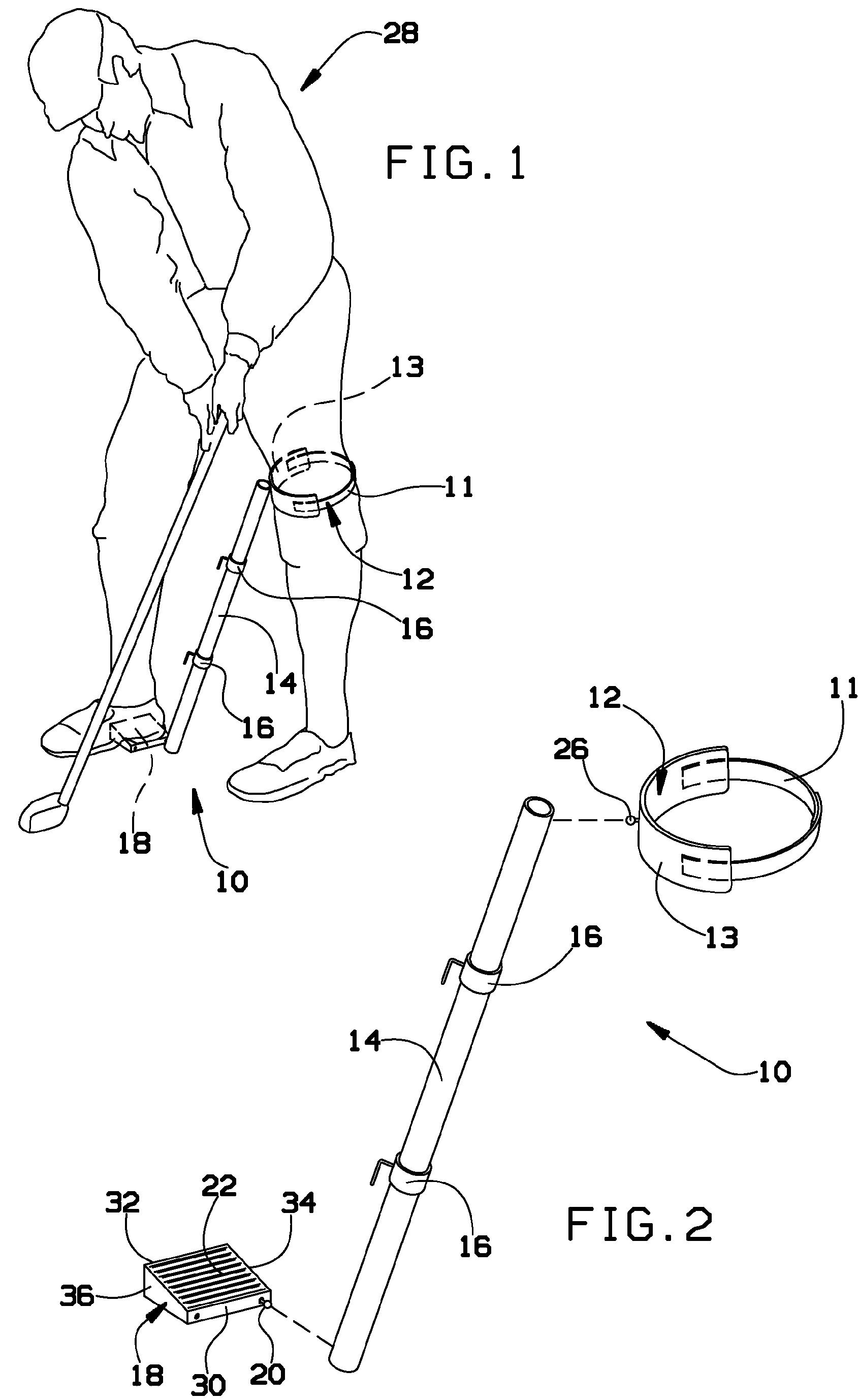Round 1: Inventions Directed to Controlling the Lower Body During a Golf Swing
What is more important during a golf swing, controlling the movement of your leading leg or your trailing leg? Beats me. Heck, if I knew then I would be a much better golfer.
The reason I ask is that the USPTO records reveal two recently disclosed golf training inventions that take different approaches to controlling a golfer’s lower body. The first invention is disclosed in a patent application that recently published as US Pub. No. 20090105005 titled “Golf Swing Training Device.” Check it out.
The application explains:
What do you think? I am not sure that I would buy it, but I would give it a try.
Dave Dawsey - Tracking Golf Swing Inventions
PS – click HERE to check out interesting putter posts
The reason I ask is that the USPTO records reveal two recently disclosed golf training inventions that take different approaches to controlling a golfer’s lower body. The first invention is disclosed in a patent application that recently published as US Pub. No. 20090105005 titled “Golf Swing Training Device.” Check it out.
The application explains:
[0007] A golf swing has three main components: 1) a backswing, where the club is moved away from the ball in the trailing direction, 2) a downswing, where the club is moved toward the ball in the leading direction, at the bottom of which the ball is hit; and 3) a follow-through continuing in the leading direction after the ball is hit.
[0008] A common swing method from the 1970's typically involved a pronounced lifting of the leading heel, rotating the hips horizontally past 45 degrees, and sliding the leading leg in the trailing direction during the backswing. These movements created a radical change in spine angle through impact into a follow-through position, called the "reverse C", in order to propel the ball into the air. This earlier method was hard for students to learn, and required that the golfer have excellent coordination for any success.
[0009] In response to these shortcomings, many effective modern swing methods have developed that have a much higher success rate for new players. These modern swing methods concentrate on minimizing or eliminating leading leg motion. These modern swing methods also maintain the integrity of down the line and face on spine angles throughout the swing. The modern swing involves 1) keeping the leading heel down, 2) rotating the leading leg, and 3) not sliding the leading leg in the trailing direction. This leg action creates a golf swing where the spine angle remains consistent throughout the swing, the spine turns in a coiling motion, and the spine does not have any lateral movement. Modern swing methods all agree that the golfer should start with the spine tilting slightly forward when viewed from down the line, and with the spine either vertical or tilted slightly in the leading or trailing direction when viewed from face on. Modern swing methods agree that the golfer's spine angle should then remain consistent throughout the backswing and the downswing. The general result of these modern swing motions is increased consistency, accuracy, and power.
ABSTRACT: The present invention is a golf swing training device which guides the golfer's leading leg in an arc around the trailing heel, maintaining a minimum distance between the leading leg and trailing heel. This device guides the golfer's leg action in a 3-dimensional manner to produce a coiling motion on the backswing, which maintains a consistent spine angle as recommended by modern golf instructors. This device comprises a leg brace with flexible cuff which attaches to a golfer's leading leg above the knee, an adjustable strut, and a heel base for the golfer's trailing foot which tilts slightly in the leading direction. For left-handed golfers, this device substitutes a heel base with opposite swivel placement and tilt. This invention resets automatically to the correct position during practice sessions. The benefit for a golfer of using this invention is increased consistency, accuracy, and power.
What do you think? I am not sure that I would buy it, but I would give it a try.
Dave Dawsey - Tracking Golf Swing Inventions
PS – click HERE to check out interesting putter posts


Comments